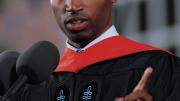When Anthony C. Woods, M.P.P. ’08, delivered the graduate English address at Commencement last June (shown at right), he had just made a momentous decision: to publicly acknowledge his homosexuality and effectively end a military career that had spanned nine years and two tours in Iraq.
Woods did not mention this decision in his speech. Soon after, though, the West Point graduate and U.S. Army captain informed his commander that he was gay, initiating his dismissal under the “Don’t ask, don’t tell” policy. In early November, Woods learned he would be “eliminated” from the army on the grounds of “moral and professional dereliction” and required to repay $35,000—the amount of his scholarship to attend the Kennedy School.
A military career may seem a curious choice for a young man who is gay or even questioning his orientation. But for the son of a single mother, growing up in an Air Force town in northern California, acceptance to West Point was an honor—and an opportunity—beyond compare. Woods focused on the professional to the exclusion of the personal; with the country at war, that wasn’t hard. But two years at Harvard gave him space to think—and to face his dismal prospects for upward mobility in an organization with an explicit homosexuality ban and a strong culture of marriage and children. Even if he had stayed closeted, he says, “It wasn’t going to be possible for me to fit the mold, and I knew that because of that, there was going to be a glass ceiling.”
Even after the invasive court-martial process—the military conducts interviews with friends and family to verify homosexuality, presumably to prevent fraud, for instance by soldiers who wish to avoid an additional tour in Iraq—Woods is reluctant to malign the officers who carried out his investigation. He says they are simply implementing a policy. Change might come from Congress, but Woods believes the Supreme Court is a more likely venue: “I think it’s going to take a landmark court case, like Brown v. Board of Education.”
As recently as a year ago, Woods thought life after Harvard would include at least five more years of military service. He had been accepted to teach at West Point—“a huge, huge dream,” he says. Now, even as he waits to hear whether his discharge will be honorable or dishonorable, Woods has begun a new chapter: while working as staff secretary to New York governor David Paterson, he is applying to law school. He dreams of a role in changing the policy that cut his own dreams short. But his decision to come out already constitutes a significant first step. “If this policy’s ever going to go away,” he says, “they have to lose talented people. It’s not going to go away unless it hurts.”









